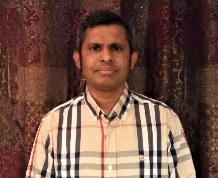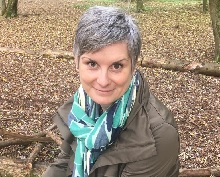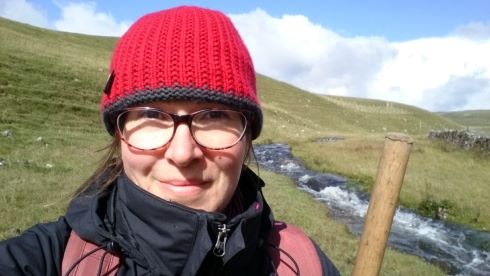Member profiles: eDNA, fermentation and virtual learning
Our latest member profiles explore the working lives of freshwater ecologist Dr Rosetta Blackman MRSB, product development and R&D manager at Rentokil Initial Dr Kanagasooriyam Kanagachandran MRSB and Dr Hannah Gauci MRSB, biology qualification director at the Open University
A Day in the Life
Rosetta Blackman MRSB on using eDNA to study aquatic biodiversity in rivers
My alarm goes off... Early, when I’m in the field. Our sampling campaigns are like military operations: we prepare sample site grab-bags the day before, which include all the necessary equipment to collect and filter the water, meaning we are ready to work quickly when we reach a site.
Environmental DNA (eDNA) is made up of shed cells from species that live in or have contact with the water, so when we collect these samples we try to cover large areas, such as a whole catchment, in a relatively short time span – we are aiming to collect a snapshot of the biodiversity at that time. Because eDNA samples are collected by filtering water directly from the river, we try to avoid sampling after rainfall as rivers can become too turbid to sample – so sunny weather fieldwork is a bonus.
My work involves… Looking at aquatic biodiversity and the effects of anthropogenic pressures on it. In combination with molecular tools I often use traditional data collection methods such as electrofishing or macroinvertebrate kick-nets.
Recently I have been working on a molecular approach to construct food webs across a river catchment over the course of a year. This work shows the change in distribution of key taxa such as fish and macroinvertebrates across the catchment, alongside the fluctuation in food web dynamics due to changes in resources associated with the seasons.
My aim is to develop this work and look at multiple groups in an ecosystem, rather than studying groups in isolation, so we can understand how anthropogenic pressures affect the whole system. I hope in the future we are able to identify and mitigate against these negative impacts and prevent biodiversity loss.
On a typical day… Once we have finished a fieldwork campaign I will either be doing laboratory work or data analysis. In the specialist laboratory at our institute we wear a forensic bodysuit, face mask and slippers to prevent our own DNA contaminating the samples. I typically extract DNA from the samples in the morning and then run tests in the afternoon to amplify the DNA we have ‘caught’.
The laboratory work culminates in sequencing all the samples and identifying the DNA sequences. One of the most exciting parts of working with eDNA is checking the species list for the first time. I am always excited by the range of species we find, from rare stoneflies to birds such as dippers and kingfishers, or mammals such as beavers.
I work… In a busy and exciting department with scientists from a multitude of disciplines. Every week I hear talks or speak to colleagues who work on a range of aquatic-related disciplines, and there is endless new research to learn about, to collaborate on and to be inspired by.
After work… Friday beers are a regular highlight for us and we often go to the roof of our building to see the mountain views. Being in Switzerland I’ve enjoyed a fair few fondues during research retreats too. Home is just a short walk away from work along a beautiful river. As an ecologist I spend a lot of time enjoying the outdoors, be it in the mountains or the local forest.
Rosetta Blackman is a postdoc at Eawag (the Swiss Federal Institute of Aquatic Science and Technology) and the University of Zurich, Switzerland. Find out more about her work at www.rosettablackman.com or by following @rosiecblackman on Twitter.
The Career Ladder
Kanagasooriyam Kanagachandran MRSB using biotechnology for positive change

I first discovered biology in Batticaloa, an area of eastern Sri Lanka blessed with rich flora and fauna. This unique city is also known as ‘the land of the singing fish’ after the mysterious seasonal sound made by certain fish that has been recorded here since the 18th century.
At a young age I was fascinated by this watery wonder in the lagoon. Childhood conversations with my father, a well-known science teacher in the region, slowly fostered my interest in biology and chemistry, which became my favourite subjects in school. I have fond memories of our discussions when my father took me on bicycle rides.
I studied for an undergraduate degree in applied biology from the University of Hertfordshire, where I stayed on to complete my PhD. My research was focused on the production of lactic acid as a commodity from agricultural byproducts. Part of my PhD work was carried out at Kyushu University in Japan.
My background is in farming. I am from a farming family and consider myself a farmer of modern times, unlike my ancestors I cultivate and harvest cells in bioreactors. My expertise in fermentation process development is a means of farming that can be scaled up to meet future needs, improving the yields of commodities while maintaining consistent quality and making it commercially feasible.
A pivotol point in my career was receiving an Honorary Fellowship from the School of Science at Swansea University. I am delighted and honoured by this recognition of my contribution to science and technology over the last 20 years. During my career I have always tried to challenge myths and conventional wisdom in the biotech field.
Currently I assess, recommend and develop new technology and service opportunities for the growth of Rentokil Initial’s global hygiene and pest control businesses.
In the future I hope to use biotechnology as an agent for change for a better future for our planet and for future generations, such as green-process strategies, waste conversion, sustainable and safe food production and processing, and low-toxicity technical solutions.
My Society and me
Hannah Gauci MRSB on the usefulness of RSB accreditation

I oversee the development and delivery of the biology curriculum at the Open University (OU) and support students through their qualifications. OU biology students study mostly via a virtual learning environment supported by tutors. They develop their practical biology skills by conducting investigations at home and in the Open Science Laboratory, where they can use a virtual microscope, explore an interactive 3D brain, and much more.
We were really pleased to have our excellence in biology teaching acknowledged when our degrees gained interim accreditation status from the RSB in 2020. The accreditation process stimulated more development of our curriculum, resulting in exciting improvements to our undergraduate capstone module. Students can now select a project from dataset, field-based and lab-based options that best suits their circumstances and career aspirations.
Taking part in Society development events on the capstone experience has been incredibly useful to learn more and share good practice. Our students are very proud to be completing an accredited degree and have enjoyed taking part in Biology Week activities and finding out more about what the Society can offer them.



